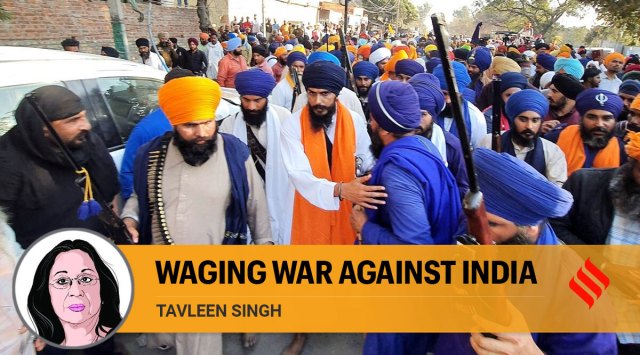
There was a surreal quality about last week. In Delhi, a Congress Party spokesman who misspoke the Prime Minister’s name was dragged off a plane and charged with waging a war against the Indian state. Meanwhile, in Punjab, a Sikh preacher called Amritpal Singh was waging a real war against the state by leading an angry mob in an attack on Ajnala police station to demand the release of a comrade. As far as I know, he has not been charged with this yet.
It was also a week in which Punjab’s new militant preacher was seen on national television for the first time. As I watched him being interviewed, a chill went down my spine. Maybe I am paranoid about militant movements in Punjab, but I have good reason to be. In the early eighties I covered the rise of Jarnail Singh Bhindranwale and his ascent from rural preacher to political heights began as insidiously and with the same ideas. When Amritpal Singh was asked about his open support for Khalistan, this is what he told the TV reporter in fluent English, “I am trying to revive Sikhi and for that we have to revive the Khalsa Panth and that to me is Khalistan.” He added that it was an idea that should be discussed in the same way that Hindutva is being discussed.
For a while now there have been rumours of secessionism brewing again in Punjab but the first glimpse of the man who could be the cause of it came only last week after the police station was attacked. Very little is known about this militant preacher other than that he was baptized as a Sikh not long ago and that before his current incarnation he was a businessman in Dubai. Now that he has emerged as a Sikh leader, theories of why he is attracting the support of religious Sikhs abound. Some say that the rise of belligerent Hindutva with the silent acquiescence of the Prime Minister could be a reason. Others say that the mishandling of the farmers agitation against the three farm laws could have been a trigger.
At the time when farmers squatted on the highway to Delhi for more than a year, the response of the Government of India and the BJP’s social media army was to malign them as Khalistanis. There was, if you remember, that ludicrous ‘toolkit’ theory floated in which a famous climate activist and an American rock star were charged with conspiring against India through a Khalistani ‘toolkit.’ The Delhi police were so sure of this theory that they flew off to Bengaluru to arrest a young woman called Disha Ravi whom they accused of working with Canadian Sikh militants to create chaos in India.
It is hard to say if Amritpal Singh would have garnered the support that he clearly has if the farmers movement had been better handled. What it is possible to say is that once more Punjab is seeing a ‘war against the Indian state’ led by a fanatical Sikh preacher. Last time this happened it led to the army being forced to enter the Golden Temple and that did not turn out well at all.
Bhindranwale and his closest companions were taking shelter in the Akal Takht, and it was this symbol of political Sikhism that was destroyed in the battle called Operation Bluestar. There are many gurudwaras but only one Akal Takht but neither Indira Gandhi nor the soldiers who went into the Golden Temple knew its significance. Mrs Gandhi ordered it to be rebuilt by the government without realizing that it would be pulled down and rebuilt again because it is only through ‘kar seva’ that it can be built.
The reason I make this point is because later, when many lives had been lost and much blood shed in the Golden Temple, political pundits speculated for a long while on why Mrs Gandhi seemed not to have any Sikh advisors. We must hope that the Modi government is better informed. We must hope that there are those around the Prime Minister who remind him of what happened when there was last a Sikh preacher making trouble in Punjab.
The Prime Minister himself seems to have realized, after the disastrous handling of the farmers agitation, that there was a need to make peace with the Sikh community. He has made gestures like celebrating the martyrdom of Guru Tegh Bahadur on a grand scale and commemorating the extraordinary courage of Guru Govind Singh’s sons with a national day called Vir Bal Divas. The two boys, aged nine and six, were buried alive because they refused to become Muslims.
It is time that the Prime Minister also noticed that there has been too much mixing of religion with politics on his watch and by his most ardent supporters. This mixing of religion and politics always turns ugly. A quick glance through the recent history of Punjab provides more than enough proof that preachers and other religious men should be kept firmly away from interfering in political matters. As someone who remembers well what Punjab was like the last time a preacher became a political figure, I find the rise of Amritpal Singh extremely disturbing. Punjab has just recovered fully from the nightmare that it went through in the eighties and the nineties. This nightmare must not be allowed to unfold again.